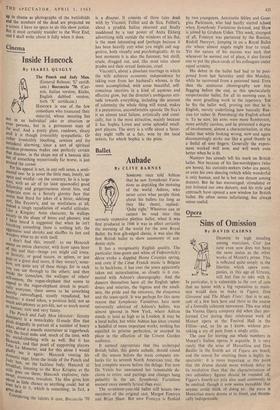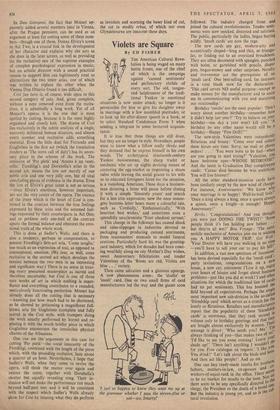Opera
Sins of Omission
By DAVID CAIRNS
DESPITE its high standing among musicians, Cosi fan tutte even now does not have the same status as the other works of Mozart's prime. This is reflected quite simply in the liberties which opera com- panies, in this age of Urtexts, still feel free to take with it. In particular, it is vulnerable to the sort of cuts that no house with a big reputation to main- tain would dare to make in Figaro, Don Giovanni and The Magic Flute: that is to say, cuts of a few bars here and there in the course of a formally coherent movement. This was what the Vienna Opera company did when they per- formed Cosi during their celebrated week of Mozart opera at the Festival Hall in the Fifties—and, so far as I know, without pro- voking a cry of pain from a single critic.
The case for leaving out whole numbers in Mozart's Italian operas is arguable. It is very rarely that the arias of Marcellina and Don
Basilio in the fourth act of Figaro are heard, and the reason for omitting them is highly re- spectable: it is more important at this point that the drama should move without delay to
its resolution than that the characterisation of two subsidiary figures should be rounded off. Figaro's fourth-act aria also used commonly to be omitted, though it now seems incredible that anyone could think of doing so: the piece is Mozartian music drama at its finest, and theatri- cally indispensable. In Don Giovanni, the fact that Mozart ap- parently added several numbers later in Vienna, after the Prague premiere, can be used as an argument at least for cutting some of these num- bers—though one of them, Donna Elvira's scena in Act Two, is a crucial link in the development of her character and explains why she acts as she does in the later scenes, as well as providing (in the recitative) one of the supreme examples of complex psychological expression in music; but an artistic director with a sound practical reason to support him can legitimately treat as alternatives the two tenor arias, one of which was written to replace the other when the Vienna Don Ottavio found it too difficult.
Cosi fan tutte is, of course, wide open to this second category of cuts. And, given complete, without a note removed even from the recita- tives, it is admittedly a long work. Yet of all Mozart's operas it is the one that is most spoiled by cutting, because it is the most highly organised and closely knit. The drama of Cosi lies exclusively in the subtle analysis of a single, narrowly delimited human situation, and almost every number and recitative adds something essential. Even the little duet for Ferrando and Guglielmo in the first act (which the translation renders as 'The stern call of duty') has its neces- sary place in the scheme of the work. The omission of 'Per pieta' and 'Amore h un venti- cello,' Fiordiligi's and Dorabella's arias in the second act, means the loss not merely of one noble aria and one very jolly one, but of vital concluding pieces of evidence in the drama. Even the loss of Elvira's great scene is not so serious —since Elvira's emotions, however important, are not the very centre of the opera. The essence of the irony which is the heart of Cosi is con- tained in the contrast between the true feelings expressed by these arias and the assumed feel- ings expressed by their counterparts in Act One; and to perform only one-half of the contrast upsets the formal balance and obscures the emo- tional truth of the whole work.
This is done at Sadler's Wells; and there is also a tendency, perhaps in compensation, to present Fiordiligi's first-act aria, 'Come scoglio,' too much as an expression of real, as opposed to conventional, emotion. (We lose, as well, some recitative in the second act which develops the tension between the two men in an interesting and significant way.) There is no sense in treat- ing every presumed masterpiece as sacred and therefore uncuttable; but Cosi is one of those rare works of art in which nothing is super- fluous and everything contributes to a rounded, meticulously functioning perfection. Mozart has already done all the cutting that is necessary —knowing just how much had to be shortened, as he showed by jettisoning a magnificent full- blown aria for Guglielmo (complete and fully scored in the Cosi style, with trumpets doing the work usually performed by horns) and re- placing it with the much briefer piece in which Guglielmo enumerates the irresistible physical charms of the Albanians.
One can see the arguments in this case for cutting 'Per pieta'—the vocal insecurity of the Fiordiligi, combined with the length of the piece which, with the preceding recitative, lasts about a quarter of an hour. Nevertheless, I hope that Sadler's Wells, when they come to revive the opera, will think the matter over again and restore the scene, together with Dorabella's shorter but equally revealing song. Their in- clusion will not make the performance run much beyond half-past ten; and it will be consistent with the respect which Sadler's Wells already show for Cosi by treating what they do perform as inviolate and scorning the baser kind of cut, the cut in mediis rebus, of which not even Glyndebourne are innocent these days.



































 Previous page
Previous page